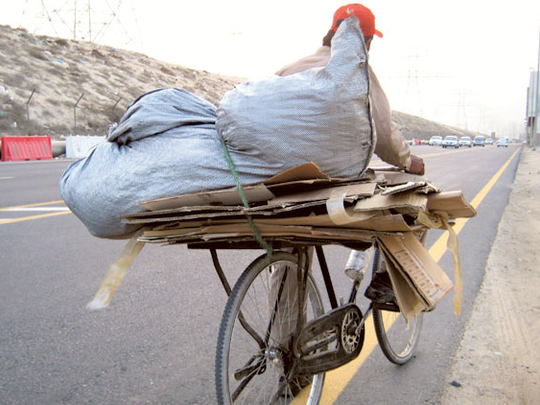
Dubai/Sharjah: Scrap mafia bosses in Sharjah have recruited an army of scavengers to scour a Dubai landfill for waste materials worth a fortune in the global recycling market, Gulf News can reveal.
The illegal recruits collect metal, plastic and paper from the giant landfill — near the Dubai-Sharjah border on Emirates Road — and sell it by weight to underground scrap dealers at hideouts in Sharjah’s industrial areas.
Dealers then offer the materials in bulk to recycling companies locally and overseas at below-market prices to undercut legal competition, industry sources said.
The racket is a public health and safety threat, say officials who are planning stiffer fines and punishments for operators who are not authorised to handle waste materials.
Gangs used to frequent waste bins on Sharjah streets by night after government inspectors finished their shifts, but following a crackdown since last year they have now brazenly taken to the Dubai landfill — a goldmine in terms of recyclable waste materials.
The scavengers say up to a thousand of them raid the landfill on Fridays, making it impossible for the few guards there to patrol the vast facility. “A few of us keep the guards busy with chases, while others collect the stuff. We’ve got our own turfs and teams,” said Zakir, a Bangladeshi man who makes about Dh600 per month from selling trash to dealers.
“I know it’s illegal, but I’m doing this because I’ve got nothing left. My employer made me work for months without pay. I’ve got a family back home to support — the dealers pay me on the spot.”
He added that the dealers have “lookouts and intelligence” on who gets arrested or questioned where and when, making it easier for others to evade action. “We can lie low for weeks, just eating and sleeping in our rooms. When things cool off, we come out again,” he said.
Others said they work for the dealers to supplement income from day jobs or because they cannot work for anybody else, as they entered the UAE illegally or on visit visas.
“Many of us have no passport; we slipped in on cargo ships. We work for a while and go back. We keep our national ID card from our country, so we can return under amnesty programmes for illegal workers in the UAE,” said a young Pakistani who has taken up the trade.
The scavengers refused to give away the dealers’ identity or location details, but said they were mostly Pakistanis with “transport truck” (cargo) operations as front businesses.
Feroz Khan, a recycling expert who works for a large Sharjah-based recycler, also said the dealers were mainly Pakistanis. He explained that some of those involved are licensed scrap traders, but illegally source the material.
Only a handful of professional waste management companies are allowed to collect and handle trash from public areas, gated communities or hotels, Khan added.
“There are standards in the UAE, lab tests, and a proper supply chain in place that everyone — the waste management company, scrap trader, recycler, reseller, or exporter — must follow for safety and quality reasons. But some traders are filling the gap in the huge production demand — 4,000 tonnes a month in recyclable plastic alone — with cheap material delivered right to your doorstep. Some recycling companies don’t always say ‘no’ to that,” Khan said.
“If plastic costs Dh2,000 a tonne from the waste management company, traders will give it to you for only Dh1,500. After recycling it can fetch Dh3,500 a tonne. This varies with market conditions.
“It’s a big business.”
Authorities from various government departments in Dubai are holding high-level meetings to tackle the problem, a top Dubai Municipality official told Gulf News.
Abdul Majeed Saifee, director of the municipality’s waste management department, said: “What these people are doing is not only illegal, it’s dangerous. There’s heavy equipment working there at the landfill, methane gas, other hazards. We’ve handed out Dh1,000-fines for collecting from rubbish bins, but that’s not stopped them. We’re working with police and immigration for bigger punishments — maybe [higher] fines, or even deportation.”
He said the landfill is fenced and guarded but “there’s too many of them [scavengers] on weekends, and the area’s quite big.”
Saifee added: “There are around 20 companies in Dubai licensed properly in waste management services. There are laws and legal action that will be taken against violators. It’s a health and safety issue. We’re talking about their own safety, they have to understand that.”
Many of those in this risky line of business can be spotted trudging back to Sharjah from the Dubai landfill along Ring Road which leads to the industrial areas, with the bags neatly balanced on their heads.











